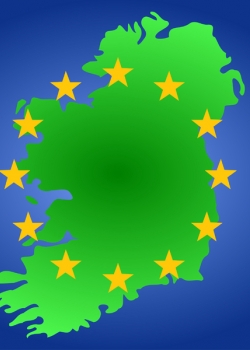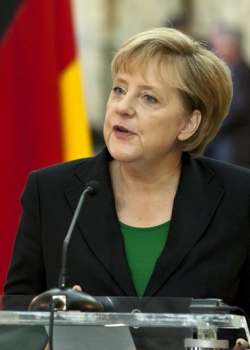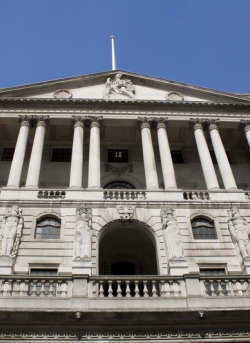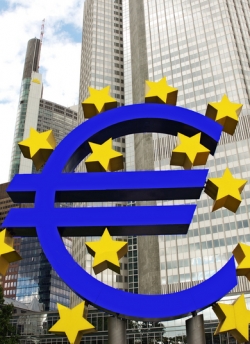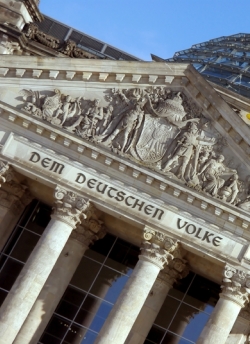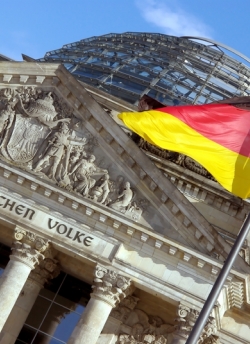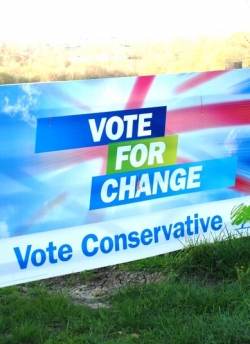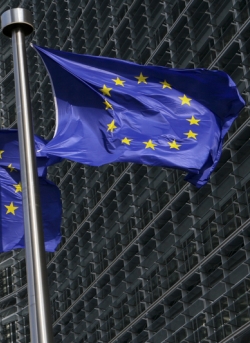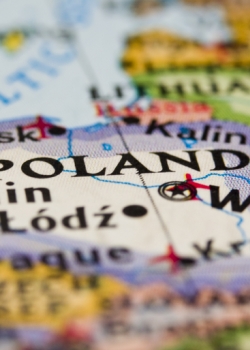The roles & policies of other member-states
Why Ireland should ratify any eurozone treaty early
18 December 2011
The Sunday Business Post
EU officials are putting the final touches to the first draft of a 'fiscal stability' treaty to be ratified by eurozone countries by the end of 2012. The treaty - which commits each euro government to run balanced budgets in perpetuity - will be one of the oddest ever signed...
Believe it or not, Angela Merkel has a plan to tackle the euro crisis
05 December 2011
The Guardian
While Merkel's vision for a fiscal union may not be the answer to all the eurozone's problems it could be a vital part of any solution.
A new "fiscal union" to underpin the euro is the main topic that Angela Merkel and Nicolas Sarkozy will discuss at their Paris meeting. Merkel...
A new "fiscal union" to underpin the euro is the main topic that Angela Merkel and Nicolas Sarkozy will discuss at their Paris meeting. Merkel...
Is Austerity George saving the UK economy?
30 November 2011
The Times
Britain’s unlikely status as a safe haven is more to do with Europe’s problems than our cuts.George Osborne likes to point at Britain’s record low borrowing costs — the Government can issue ten-year debt at just over 2 per cent — as proof of confidence in his stewardship of the economy.
European leaders must step up their game
11 July 2011
Financial Times
George Soros is right that Germany's new approach to Europe bears some responsibility for the eurozone crisis. Germany's leaders are finding it hard to consider broader European rather than immediate national interests.
The price of German leadership
17 November 2010
Financial Times
The euro, the European Union’s boldest and most ambitious project, is under threat. Divisions among Europe’s leaders, and their inability to stabilise the euro, have damaged the EU’s reputation on other continents. The good news is that the EU now has an emerging leader.
Why Germany is not a model for Europe
10 November 2010
Der Tagesspiel
Germany's economy has been winning numerous plaudits of late. It is not hard to see why. Previously much-vaunted economies "Ireland, Spain, the UK and the US, to name just four" lived way beyond their means for far too long.
Der Härtetest kommt erst noch
16 August 2010
Handelsblatt
Deutschlands Wachstum im zweiten Quartal war außergewöhnlich. Das Wachstumstempo beizubehalten wird aber sehr schwierig, sagt Philip Whyte, vom Londoner Think-Tank Centre for European Reform.
Germany's euro advantage
13 July 2010
International Herald Tribune
Prior to the introduction of the euro, European economies running big trade deficits routinely devalued their currencies against the Deutschmark and other currencies tied to it. This prompted allegations of beggar-thy-neighbor activity and even calls for protectionism.
Merkels bezuiniging is onverantwoordelijk
14 June 2010
NRC Handelsblad
Het Duitse besluit om sterk te gaan bezuinigingen is volkomen verkeerd. De Duitsers moeten juist gaan consumeren, betoogt Simon Tilford.
Elke economie in de eurozone slaat halsoverkop aan het hakken in de overheidsuitgaven. Het lijdt geen twijfel dat de eurozone en de EU als geheel een grote uitdaging op begrotingsterrein te...
Elke economie in de eurozone slaat halsoverkop aan het hakken in de overheidsuitgaven. Het lijdt geen twijfel dat de eurozone en de EU als geheel een grote uitdaging op begrotingsterrein te...
Tory Euroscepticism is being sidelined
14 May 2010
The Guardian
For those of us who hope Britain will engage constructively with the EU, the formation of the Conservative-Liberal Democrat coalition is good news.
Tre getingar till Reinfeldt som EU-ordförande
29 December 2009
Sidan 4: Debatt
Statsministern och hans team var kompetenta förhandlare. Men de stora framgångarna lyste med sin frånvaro under ordförandeskapet, skriver Clara Marina O'Donnell.
Look who's sclerotic
28 September 2009
International Herald Tribune
A popular Continental misconception about Britain is that it is some kind of ultra-free economy where there is limited social welfare and where the market has been introduced into every aspect of life.
Warsaw warms to Moscow
18 September 2009
The Guardian
Tabloids make a poor guide to understanding a country's policy. While the newspaper headlines in Poland and the Czech Republic scream of the US "betraying" eastern Europe by cancelling missile defence bases there, the official reaction in Warsaw and Prague has been muted.
Germany will not drive a European recovery
01 September 2009
Financial Times
The European Union’s biggest member goes to the polls in less than four weeks. Yet while Germany’s economic prospects rest precariously on a recovery in foreign demand, the campaign has been free of any real debate about the country’s extraordinary export dependence. This is worrying.
A sustainable EU economic recovery requires...
A sustainable EU economic recovery requires...
Guest column: Spain's muted EU voice
09 June 2009
Financial Times
There are several paradoxes about Spain’s global role. Its business leaders have built up many world-beating companies, but its politicians tend to be parochial.
Por qué pesa poco España?
08 May 2009
ABC.es
El papel de España en la UE encierra una extraña paradoja. Aunque se trata de uno de los Estados miembros más europeísta, es el que menos influencia tiene de los seis países más grandes. Pero esto no siempre ha sido así.
Yes we can - and here's how
03 April 2009
E!Sharp
The credibility of Ireland’s already weak government will be on the line when it puts the Lisbon Treaty to a second referendum later this year.
Ten years on, the eurozone must beware of Greeks bearing debts
29 March 2009
The Times
Europe's leaders have plenty to fret about. The Czech Government, which holds the EU presidency, has collapsed. The European Commission is battling against the protectionist instincts of some states.
It's a fabrication that Britain doesn't make things any more
13 March 2009
The Times
Nicolas Sarkozy stung us when he claimed last month that Britain, unlike France, “has no industry”. Since the implosion of the financial sector, it has become an article of faith that the British economy is paying for its excessive reliance on services.
Unilateral Germany threatens to weaken Europe
05 December 2008
Financial Times
In Brussels, Paris, Washington and other capitals, one increasingly hears the same complaint: Germany is acting unilaterally. On a broad range of issues, the Germans seem to think the European Union no longer advances their interests and are more prone to go their own way. Germany’s foreign policy has evolved...

